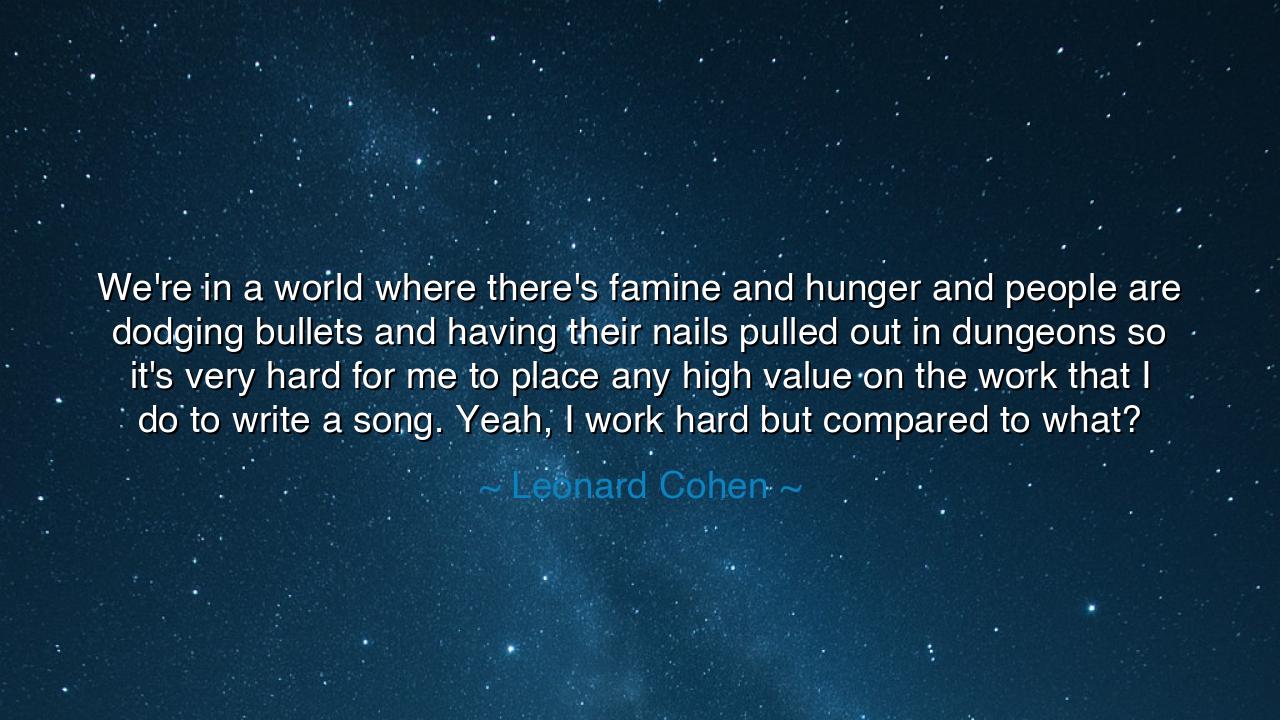
We're in a world where there's famine and hunger and people are
We're in a world where there's famine and hunger and people are dodging bullets and having their nails pulled out in dungeons so it's very hard for me to place any high value on the work that I do to write a song. Yeah, I work hard but compared to what?






The words of Leonard Cohen, “We’re in a world where there’s famine and hunger and people are dodging bullets and having their nails pulled out in dungeons, so it’s very hard for me to place any high value on the work that I do to write a song. Yeah, I work hard but compared to what?” are spoken with the humility of one who sees beyond himself. He acknowledges the weight of suffering borne by countless souls, and in the face of such torment, he casts his own labors in a humbler light.
For in the shadow of famine and hunger, the toil of writing, though noble, seems but a small flame against a storm. Cohen places the agony of the oppressed — the tortured in dungeons, the fearful who are dodging bullets — beside the crafting of a song, and thus reveals the vast gulf between survival and art. Yet in this confession lies not disdain for his craft, but an awareness of proportion, a recognition of the gravity of human suffering.
The ancients, too, knew this paradox. They sang hymns and carved poems even in times of war and exile, aware that art may seem slight compared to bloodshed and cruelty, yet still it endures as the voice of the soul. Cohen, by questioning the worth of his song, elevates its meaning: for art gains its true power not by rivaling suffering, but by bearing witness to it.
So these words are not of despair, but of perspective. To say, “compared to what?” is to remind future generations that labor, no matter how devoted, must be weighed against the vast canvas of the world’s trials. And yet, though he diminishes the weight of his own work, the very act of song becomes a testament — a whisper of beauty amidst chaos, a vessel of solace amidst pain.






VDLe Van Dung
Cohen’s reflection about the value of his work against the backdrop of suffering in the world speaks to a deep existential questioning of purpose. Is it possible to reconcile the desire to create art with the awareness of so much human hardship? Does art, at its best, help shine a light on these harsh realities, or does the artist’s privilege create a sense of detachment from the struggles they aim to highlight?
LKPham Le Khang
Leonard Cohen’s words highlight a common internal conflict that artists may feel, particularly when the world seems to be drowning in suffering. Is creating art, in light of such atrocities, somehow trivializing? Or, could it be that art has a unique role to play in bringing attention to the injustices Cohen mentions? Does writing a song, for example, have a different kind of power when placed against the backdrop of human suffering?
KTLe Ngoc Khanh Tang
Cohen’s humility in comparing his songwriting efforts to the extreme suffering happening in the world challenges the idea that artistic work can be seen as ‘important.’ It’s as though he’s grappling with the inherent privilege of being able to create music in a world so full of injustice. But is it fair to downplay art’s value? Can it not serve as a source of healing or awareness in such a troubled world?
BPPhuc Thinh Bui Pham
Leonard Cohen’s reflection on the weight of suffering in the world compared to his own work as a songwriter is both humbling and thought-provoking. His acknowledgment of the harsh realities that others face puts into perspective the value of artistic work. But can art, even in times of such intense suffering, still hold profound significance? How does the work of an artist like Cohen fit into a world filled with such cruelty and pain?